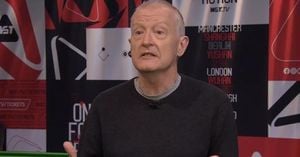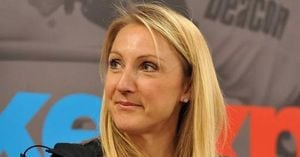The relationship between celebrity endorsements and political campaigns is nothing new, but when it came to Kamala Harris' run for the presidency, the financial details are vast and, at times, staggering. Notably, Harris’ campaign paid $165,000 to Beyoncé’s production company, Parkwood Entertainment, just one of several costly endorsements from high-profile figures during the tumultuous 2020 race.
New Federal Election Commission (FEC) records recently made public reveal both the money flow and the challenges Harris faced during her bid for the presidency. With her campaign raising over $1 billion—yes, you read it right—Harris still encountered significant financial struggles. Yet, payments to celebrity-producing companies like Parkwood, and another staggering $1 million to Oprah Winfrey’s Harpo Productions, sparked scrutiny about how the campaign choosily dispersed such monetary resources.
Backtracking to November 19, 2019, the payment to Parkwood was not just spontaneous but tied to Harris's appearance at a star-studded event alongside Beyoncé during the lead-up to the presidential election. The duo’s participation took place on October 25, 2019, at a rally held at Shell Energy Stadium—in Beyoncé's Houston, Texas, hometown—where approximately 30,000 enthusiastic attendees surged to advocate for women’s rights, one of Harris's campaigning cornerstones. While Beyoncé herself did not perform at the rally, she publicly showed her support for Harris, which undoubtedly amplified visibility for the vice-presidential hopeful.
Harris has frequently been known to enter her events to the empowering sound of Beyoncé’s “Freedom,” creating yet another layer to the star-studded partnership. Critics have questioned why such high sums were spent on production companies rather than allocating these funds directly on campaigning efforts. Yet, Harris' camp argued these expenses were simply part of the game, aligning with customary campaign strategies to engage and mobilize voters, especially among younger demographics.
This is not the first time the partnership between politics and celebrities has raised eyebrows. When examining the details, critics pointed out the need to manage such financial resources scrupulously, especially when securing high-profile endorsements can sometimes feel extravagant against the backdrop of campaign management. According to law professor Michael Kang from Northwestern University, such payments are within legal bounds as long as they align with market rates for the products and services offered, such as stage lighting, music licenses, and production costs necessary for high-quality campaign events.
Along with Beyoncé, Harris amassed endorsements from other major figures during her campaign, including Taylor Swift and Jennifer Lopez. The involvement of such famous personalities showcased Harris's broad appeal, particularly to younger voters, but raised questions about whether these endorsements would translate to votes—a gamble Harris's team hoped would pay off. While they aimed to create star-studded events with significant media attention, the actual results for Harris’s campaign were admittedly less favorable than anticipated.
Another key moment occurred with Oprah Winfrey, as Harris's campaign drew big bucks from her production company, Harpo Productions. The $1 million payment to Winfrey was executed through two separate transactions of $500,000 each, all characterized as fair payments for production services. Op-Ed pieces and critics questioned if the endorsements could truly transition financial support or galvanize the necessary voter turnout for such investments to be warranted.
Beyoncé, who had actively played her song “Freedom” during various campaign rallies leading to the event, appeared alongside Kelly Rowland at the Houston rally. Their presence was humane yet powerful—underlining solidarity for women’s reproductive rights and social justice which Harris tirelessly campaigned on throughout the election. This sung high note for Harris's message was not just about quality event production; it was also about channeling the power of charisma and connection offered through celebrity influence, something Harris, as Vice President now, continues to explore.
The questions surrounding the efficacy and ethics of Harris’ monetary allocations for celebrity endorsements reflect broader discussions around effective funding and political strategy during election cycles. Despite the soaring numbers and high-profile friendships, Harris’s presidential campaign did not bear the fruits her supporters had hoped for, particularly as many analysts and voters viewed such expenditures as risky shifts on the campaign map. Campaigns have often adopted the persona of economic strategists to build unlikely alliances through endorsements, exemplifying the complex nature of modern campaigning.
Though the whirlwind of Harris’ campaign is clearly marked with celebrity encounters, the lessons from funding practices line deeply within the political fabric. Critics and enthusiasts alike can view Harris’ jump from legislator to presidential candidate as both calculated and lavish, making it one of the biggest spectacles of fundraising and fantasy within U.S. political history. Speculations on whether her costly endorsements could have been redirected toward grassroots efforts continue to arise among political pundits. The dream to turn celebrity power ‘from the above’ gradually intertwines with the notion of ‘from the ground up’ — laying bare the duality of modern campaigns and their outreach approaches between underdog stories and celebrity companionship.
Whether Beyoncé’s endorsement served as the compelling force for change within Harris' political narrative may remain uncertain. Still, it certainly adds colorful layers to the grand story of fundraising during the 2020 campaign, inviting both intrigue and skepticism on how politics and pop-star alliances truly play out on the election battleground.



